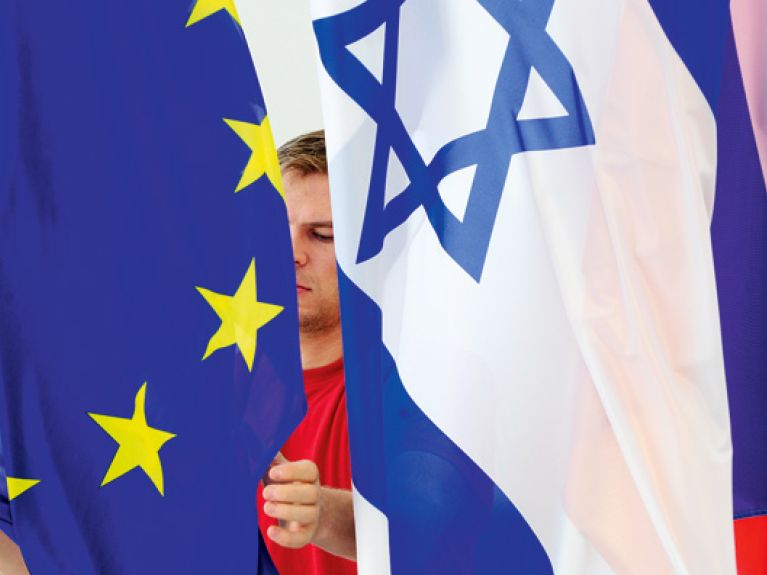The European Union and Israel –close neighbours
Despite some differences of opinion, Israel and the European Union are especially close.

Geographically, at least, the position is very clear: Israel lies in Asia. Nevertheless, the country takes part in the Eurovision Song Contest every year. And not only FIFA, the international football federation, places Israel firmly in Europe – the International Olympic Committee and FIBA, the international basketball federation, do so too.
The raw figures for trade relations between the European Union (EU) and Israel also testify to the close ties between them: almost 35% of Israel’s imports come from Europe and more than 26% of its exports go to the European Union. The large European market is vital for Israel; at the same time, Israel is one of the most important importing countries in the Middle East for the 28 countries of the European Union. It has an Association Agreement with the EU, and there is close scientific, cultural and technological cooperation in many different fields. Joint research projects are flourishing, and there is a lively exchange of school students with many countries in the European community.
Israel has been a member of the EUREKA research initiative, the programme for applied research in Europe that offers industry and research a framework for crossborder collaboration, since the year 2000. In the same year, Israel also became a cooperating state in COST. Coopération européenne dans le domaine de la recherche scientifique et technique is an interdisciplinary network for the coordination of national research activities in all areas of science and technology.
Israel is also the only non-European country to be fully integrated into the Research Framework Programme of the European Union. And when various voices suggested that Israel should receive full EU membership as a “reward” for a peace agreement with the Palestinians, at least no opposition was expressed in Jerusalem. For the moment, however, both peace and EU membership remain dreams of the future.
Today, it is the Middle East conflict that regularly leads to friction between Israel and the European Union. For example, right-wing Israeli parliamentarians left the Knesset during a speech by European Parliament President Martin Schulz because he used not quite correct figures to emphasise the poor water supply of Palestinians. When the European Union and the Arab League jointly praised the formation of a Palestinian unity government by Fatah and the Islamist Hamas recently, the Foreign Ministry in Jerusalem felt compelled to issue an official complaint.
Israelis are also irritated by the fact that goods produced in Israeli settlements on the occupied West Bank do not enjoy preferential treatment within the framework of the Association Agreement. Although the importation of these goods is permitted in unlimited quantities, they are subject to import duties like products from third countries. In Europe, on the other hand, many would like to see a clear labelling requirement for precisely these goods.
Nevertheless, differences of opinion do nothing to change their strong ties: Israel is also involved in the EU’s multilateral cooperation with partners in the Mediterranean region, such as the Union for the Mediterranean (UfM). This is the only multilateral forum in which Israel and Arab states sit down together around the table.
Israel is also involved in the EU’s Wider Europe Neighbourhood Policy, with which the European Union would like to create a new framework for relations, among others, with countries on the southern shores of the Mediterranean. This partnership aims, above all, to increase stability on external borders and provide greater access to the European internal market in the long term. An action plan especially tailored to Israel is intended to indicate the path towards a further intensification of relations between Israel and the European Union in different areas. ▪
Michael Borgstede

